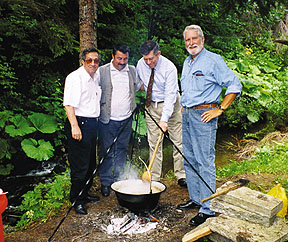 |
| Joint efforts sometimes extend beyond strictly business and professional matters |
ICPDR presidents change every year and before they have taken the flavour of the Danube Basin and deeply engaged in the activities of the ICPDR - their term is usually over. Recognizing this time constraint, Fritz Holzwarth, President in 2003 decided to make a difference and start acting immediately on his agenda. Together with the Executive Secretary, Joachim Bendow, who is familiar with the problems and concerns of all Danube countries, Mr. Holzwarth made a plan to visit Romania, Bulgaria, Moldova, Ukraine and Serbia and Montenegro. The goal of the missions is to get a deeper understanding of those countries’ specific problems and concerns in the field of water management and to strengthen cooperation with all members of the ICPDR. Moreover, Fritz Holzwarth wants to encourage the central and downstream countries in particular to reinforce their efforts towards implementing the EU Water Framework Directive (WFD) in developing a common approach for the Danube River Basin District Plan.
Outstanding achievement
The decentralized actions the Romanian authorities are taking to implement
the WFD at the local and sub-basin level, which the President and the Executive
Secretary witnessed during their visit to Romania from July 18 through 22, are
only a few convincing examples of the massive effort the Danube countries –
and the EU accession countries in particular – are presently making in order
to comply with the requirements of the European legislation. These actions also
testify to the ICPDR´s outstanding achievement within the European Community
in developing common approaches for the implementation of WFD and the considerable
progress made in developing the "Roof Reports” for the Danube River
Basin District for 2003 and 2004.
Even during the Saturday and Sunday visits, the Directors and the highly qualified
and motivated staff of the Romanian water authority "Apele Române”
branch offices in Cluj-Napoca and Târgu Mures were there for Mr. Holzwarth
and Mr. Bendow to talk about the measures taken at the sub-regional level to delimitate
surface water bodies, establish the typology of water-bodies, define reference
conditions, identify protected areas and develop economic indicators. In Târgu
Mures the mission was also received by the Prefect Ovidiu Natea, who took particular
interest in all questions of water management in the Mures sub-basin and in controlling
pollution from industrial sites.
Formal and informal talks
 |
Formal talks were followed by more informal ones during the mission’s
visits to places of natural beauty and historical importance. It was particularly
interesting to pass through villages and towns that are home to Hungarian and
German minorities and it was equally good to get some first-hand experience of
the renowned Romanian hospitality. No less enjoyable – although somewhat
chilly – was the visit to the Scarisora Ice Cave in the Apuseni Mountains
(the Somes-Tisza sub-basin) where Mr. Holzwarth and Mr. Bendow found themselves
on 20-meter thick ice and enjoyed zero degree temperatures while outside temperature
was well above 30 degrees!
One issue that kept cropping up during both formal and informal talks was the
Baia Mare cyanide spill of 2000. It obviously still stirs the people’s mind,
but the overall impression was that Romania is making important efforts to build
up its mechanisms for pollution control, accident prevention and flood management.
Taking into account that Romania accounts for nearly 30% of the entire Danube
Basin, it is evident that the country’s overall commitment to integrated
river basin management and the consequent decisions and actions taken by its authorities
have major repercussions for the entire Danube Basin.
In the subsequent discussion with Ilie Sarbu, Minister of Agriculture, Forests Waters and the Environment, Florin Stadiu, Secretary of State, and Gheorge Constantin, Director of the Directorate for Water Legislation and Strategies, Mr. Holzwarth recognized the efforts Romania is presently making in order to comply with EU directives in the water management sector und underlined the proactive role Romania currently plays in the ICPDR. Mr. Bendow referred to the excellent cooperation and participation of Romanian experts and specialist in all ICPDR Expert Groups and the valuable cooperation of Romanian staff in the Secretariat. Minister Ilie Sarbu thanked for the encouraging words and objective assessment of the work of his Ministry in relation to water management and assured his political commitment and support to further strengthen cooperation with the ICPDR.
The visit brought people together, reinforced personal links of cooperation and created reciprocal esteem and understanding in the Danube "family”.